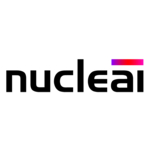
Nucleai Announces New Data Showing Better Prediction of Response to Immune Checkpoint Inhibitors for NSCLC Patients
TEL AVIV, Israel--(BUSINESS WIRE)--#aipowered--Nucleai, a leader in AI-powered spatial biology transforming precision medicine by unlocking the power of pathology data, today announced new data showing that the deep learning capabilities of the Nucleai platform accurately analyzed and classified the spatial arrangement of immune cells in the tumor microenvironment (TME) to identify metastatic non-small cell lung cancer (mNSCLC) patients who are likely to benefit from pembrolizumab, an immune checkpoint inhibitor (ICI) therapy. This work is part of several ongoing studies examining the spatial arrangement of immune cells in the TME and the significance of this research is its potential to identify new predictive spatial immune signatures in a large-scale, multi-site patient dataset.

Nucleai will present the new data in a poster presentation at ESMO Congress 2022 in Paris on Monday, September 12.
Lung cancer is among the leading causes of cancer death for men and women worldwide, as well as the second most commonly diagnosed cancer. NSCLC is the most common type of lung cancer in the United States, accounting for 82% of all lung cancer diagnoses, according to the American Society of Clinical Oncology (ASCO).
While ICI is the standard treatment for mNSCLC, only a small proportion of patients derive durable clinical benefit. PD-L1 has been shown to be limited as a predictive indicator. However, spatial arrangements of immune cells in the TME have emerged as a potential biomarker for ICI efficacy. The new data from Nucleai’s spatial biology-centric study of lung cancer patients directly addresses the medical community’s need for better predictive biomarkers for improving clinical decision-making. Nucleai teamed up with the Hospital of the University of Pennsylvania, Thomas Jefferson University Hospital, Sheba Medical Center and Rabin Medical Center for the study.
“Identifying NSCLC patients who are exceptionally sensitive to immune checkpoint inhibitor therapy as monotherapy may improve clinical decision making,” said Ori Zelichov, MD, VP of Clinical Development at Nucleai. “The results of our NSCLC study can help pharma companies select patients for clinical trials based on the likelihood of response to an ICI therapy and support physicians in planning the optimal treatment for their patients.”
Overview of the Study
Nucleai evaluated this predictive role by utilizing deep learning models to extract TME features from digitalized H&E whole slide images. mNSCLC patients treated with first line single-agent pembrolizumab in four medical centers in Israel and the US were identified. Patients were randomly assigned into training and test sets.
Pre-treatment H&E WSI were analyzed using a deep learning model to identify and classify tumor, immune and fibroblast cells as well as tumor, necrotic and stromal areas and dozens of spatial features were calculated per patient. Baseline patient characteristics and PD-L1 scores were similar between the positive and negative groups. Details will be shown at the medical oncology-focused ESMO conference.
Poster Presentation
Nucleai will present the scientific poster on Monday, September 12 during the NSCLC session at the ESMO Congress in France. The poster number is 1068P.
About Nucleai
Nucleai is an AI-powered spatial biology company with a mission to transform drug development and clinical treatment decisions by unlocking the power of pathology data. Nucleai provides pharmaceutical companies, contract research organizations, and diagnostics laboratories with a state-of-the-art AI platform to improve clinical trials and clinical decision-making. For more information, please visit www.nucleai.ai.
Contacts
Anthony Petrucci
Bioscribe
anthony@bioscribe.com
512-581-5442
Editor Details
-
Company:
- Businesswire
